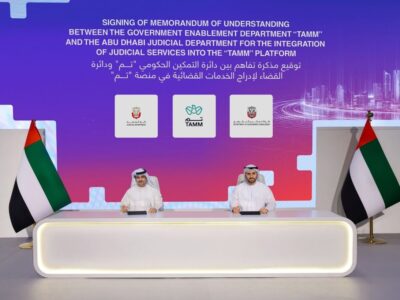In an interview with Arabian Business, Cristiana Maxion, Dubai matchmaker and tech founder behind the AI-assisted dating app MAXION, has exposed the shocking details of an audacious investment scam that could have cost her dearly – both financially and personally.
The cunning plot, which unraveled over several weeks in April, began with a seemingly innocuous cold email to Maxion, showing interest in investing in her app. Little did she know, she was being reeled into an elaborate global fraud orchestrated by a network of con artists.
The bait: A ‘wealthy’ client’s diversification play
The initial hook was expertly baited. Maxion recounted, “Before getting on the call, I looked up the domain associated with his email, and it all checked out initially. But what I realised later was that the domain was off by just one letter.”
According to Maxion, the initial approach was from an individual claiming to be a wealth advisor representing the girlfriend of a wealthy Middle Eastern client seeking to diversify her investments.
“He was asking all the right questions about the business, our traction, strategy, and funding needs,” Maxion explained. Leveraging her pre-seed funding success of $600,000 and forthcoming $1.5-2 million seed round, the scammers’ ploy gained credibility.
What followed was a dizzying spiral of lies, impersonations, and red herrings cleverly designed to obfuscate the scammers’ true motives. The “client” morphed from a Middle Eastern girlfriend to a Qatari investor relocating to the UAE. Passports and company registrations were forged, websites spoofed, and identities stolen – all to maintain the illusion of legitimacy.b
However, the storyline rapidly became convoluted. As Maxion questioned the shifting identities, the scammers nonchalantly insisted it was a “better fit” for the new “client.” “That’s how they played it off when I flagged the inconsistency,” Maxion said. “It didn’t raise enough alarms at the time.”
“They sent us a copy of the ‘investor’s’ passport, a real German doctor listed on Crunchbase,” Maxion revealed. “We looked him up; he’s a real person and CEO of some company.”
Demand for $250,000 crypto ‘commission’
Undeterred by the mounting inconsistencies, Maxion and her CFO Christina agreed to a meeting in Barcelona with the con artists posing as intermediaries – a decision that cost them over $12,000 in travel expenses during the floods in Dubai last month, which caused them to reschedule their flights three times.

“We told them we would only meet after seeing them on video call, as nobody had been on camera before,” Maxion said. The brief video interaction only heightened her suspicions when the “representative” abruptly exited for “another meeting.”
The audacity escalated as the dinner conversation turned to the “commission” at Barcelona’s Dry Martini bar. “They brought up needing the $250,000 in crypto, but secretly from the ‘investor’ because they were losing him as a client by his move to the UAE,” Maxion recounted. “They wanted to extract as much as possible from the deal.”
But the scheme reached its crescendo when the scammers demanded a staggering $250,000 in crypto as a “commission” – nearly a sixth of the target $1.75 million investment – to be physically transported on a USB drive to Brussels or Amsterdam.
“They wanted us to open a cold wallet and bring $250,000 in USDT on a USB to show ‘proof of funds’ before the investment,” Maxion explained, horrified. “They were so insistent on doing this. We told them we would only use a licensed, trusted company to do the exchange and we will only be doing it digitally.”
“I never bought crypto before this. I was like this ain’t Mission Impossible. I’m not going across international borders with a USB stick with $250,000 in USDT. That was when we started calling them out on this.”
Perhaps the most chilling red flag came when the scammers rejected any formalised agreement governing their demanded “success fee.” As Maxion remarked, “They refused to sign any terms, insisting it was a ‘trust deal’.”
The House of Cards crumbles
As Maxion and her CFO probed deeper, the facade rapidly disintegrated. Recently created domains, employees unaffiliated with the companies used as fronts, and identical scam reports on scamadviser.com all pointed to an intricate global fraud syndicate.
In a final, damning blow, the scammers balked at signing any formal agreement governing their purported “success fee,” arousing further distrust.
Ultimately, Maxion’s smarts and unwavering scrutiny enabled her to extricate herself from the scheme’s clutches. However, her determination doesn’t end there.
“I want to expose this scam to protect others, but I really want these people caught and prosecuted,” she affirmed. She is actively seeking CCTV footage from her Barcelona hotel, a potential key to unmasking the con artists.
While shaken, the intrepid founder remains undeterred in her entrepreneurial vision, exemplifying the grit that has made Dubai a global startup hub.
“I always believe you meet people to get to the next level,” Maxion said. “Maybe exposing this scam will lead to attracting good, honest investment.”
As the UAE’s startup ecosystem flourishes, Maxion’s experience serves as a stark reminder of the need for heightened due diligence and a culture of scepticism when engaging potential investors – no matter how plausible their narratives may seem.
“Look up domains, find mutual connections, watch for no video calls or lack of interest in your financials,” Maxion cautioned. “If they don’t have a team page with real photos and bios, that’s a red flag.”
While she has repeatedly tried to contact the German doctor whose credentials were impersonated, she has yet to receive a response. “I want him to know they’re using his photos and passport information for these scams so he can take action,” she stated. “These people need to be stopped.”
In this era of virtual deal-making, a “trust but verify” mindset could prove the difference between success and failure.









